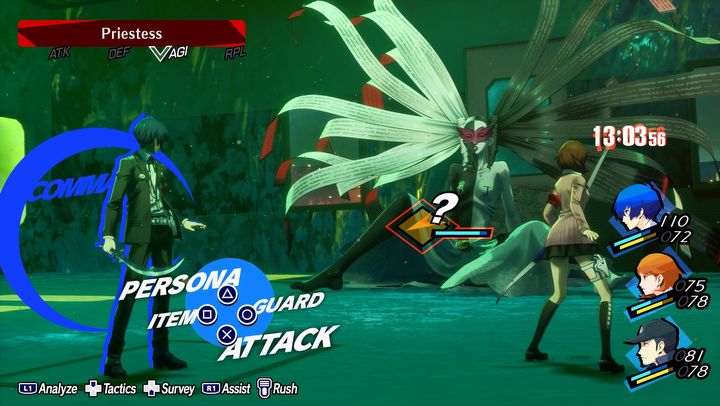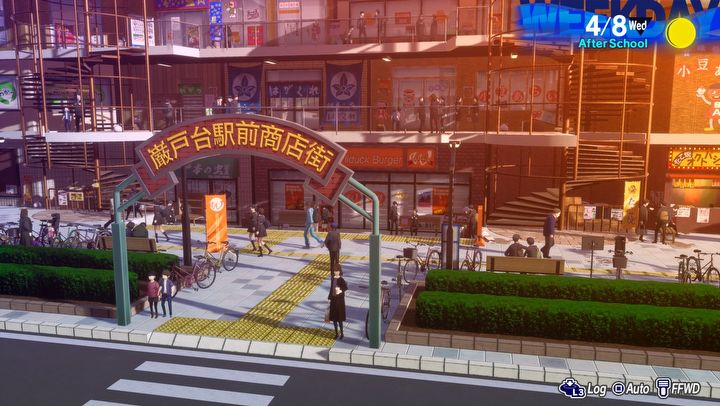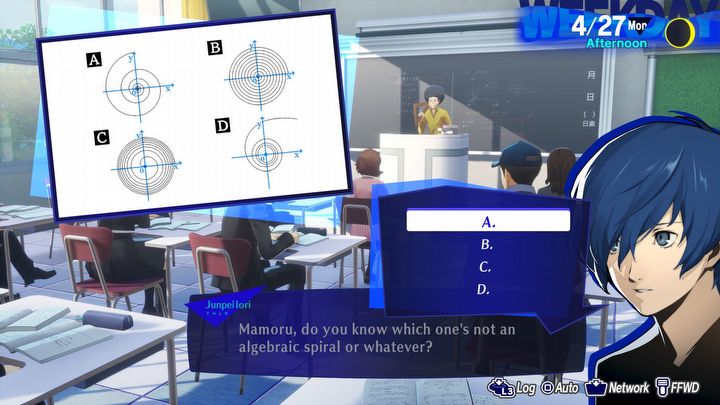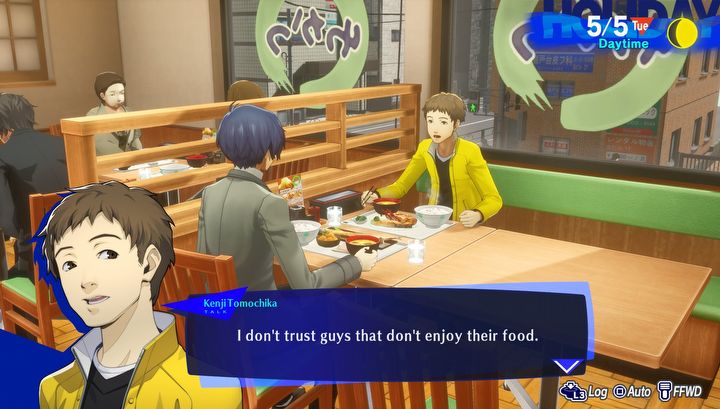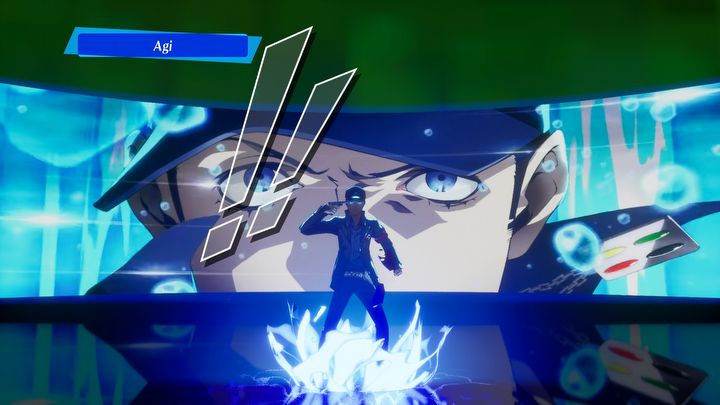Persona 3 Reload Review: A Modernized Classic
The remake of a classic faces a difficult task of carrying the legacy. But it seems Persona 3 Reload is more than able to bear this weight.
Persona games do a great job of showing us what it’s like to be a Japanese teenager and a superhero all rolled into one. From afterschool clubs, to attending cram schools, to making time to hang out with friends at karaoke or over a bowl of ramen, teenage life in Japan can be overwhelming. Add to that the task of saving the world from creatures called Shadows and your days become even more packed full of important things you need to do to succeed in both school, relationship-building, and, of course, world-saving.
- Visually stunning with a remixed soundtrack that still packs a punch
- An engaging plot and character arcs that continuously develop as you play
- Combat is more fluid and now allows for more strategic opportunities
- Climbing Tartarus for long periods of time can feel monotonous
That’s Persona 3 Reload in a nutshell. Originally released nearly 20 years ago, this remake has gotten the Persona 5 treatment. Not only does it look amazing and run smoothly, but it also features several quality-of-life improvements, combat enhancements, and additions that make it an enjoyable Persona 3 experience for anyone new to the game. Even series veterans will appreciate the familiar yet updated nostalgia that retains the charm of the original with plenty of content that puts the game more in line with modern JRPGs.
An Enhanced Persona
Persona 3’s story was first told back in 2009 and it still retains its original framework and intriguing themes. Your character returns home to Tatsumi Port Island as a transfer student at Gekkoukan High School. Here he befriends other students that have the ability to detect Shadows that roam the world during a secret hour at midnight called the Dark Hour. These Shadows are also causing people in the real world to become victims of Apathy Syndrome, and the only way to destroy them is to venture into an Escher-like tower called Tartarus at night to put an end to their attacks.
The story takes place over the course of a year, and because you are playing each day in an in-game year, you are bound to make relationships with everyone you meet. It’s inevitable and it’s the magic of a Persona game that forces you to connect with its world to further build relationships (or Social Links) that benefit you in the game but also tell unique stories that explore several dark and mature themes. No two characters you meet are the same, and topics such as death, loss, and suicide are explored in smart ways that unfurl the more you progress each day.
That’s not to say Reload is an exclusively somber experience, however. If anything, the game looks brighter, more colorful, and more alive than it ever has thanks to an improved engine and visual updates. From its evocative soundtrack, mid-battle cutscenes, down to its stylish menus that feature that iconic blue color palette—the game’s updated 2024 presentation oozes in charm. Its voice cast is also different, but the game features hours of new dialogue and fully voiced conversations that give life to the people you’ll meet. Combine that with its clever writing and new Social Links, and Reload’s storytelling easily feels superior to its humble PlayStation 2 counterpart.
Juggling Life and Shadows
Like the games that came after it, Reload plays more so like Persona 5 than it did when it first came out meaning that it’s part high school simulator and part JRPG. During the day, you spend time going to school, answering questions during class, and then deciding on how to spend your afternoons. Will you spend time with the sports team manager, play an MMORPG on your computer, or befriend the elderly couple who runs the local bookstore? At night, you can choose to do part-time work at a café, study to improve your academics skill, or muster up some courage and do karaoke by yourself.
Your actions all contribute to leveling up some aspect of your character that benefits you once you go into Tartarus to fight off Shadows. Improving your relationships via Social Links with various people, for example, powers up the Personas you use to fight in battle. Your skills open up new areas to explore and new Social Links to discover as well so you always want to be spending your time wisely leveling up some aspect of your life.
Fortunately, one of Reload’s improvements is its day and night structure causing all of your battling to occur at night freeing up your day to spend it how you want. Sure, you will still need to be aware of when certain activities and hang-outs are available to maximize your time, but you’ll then have more time to complete multiple tasks without feeling too rushed. This also means there are even more side stories and opportunities to get to know your friends better which allow the game to expand on several character arcs and introduce Social Links the original did not have.
Battles are also more user-friendly and feel like those in Persona 5 utilizing features like Shift and Theurgy that give you more of a winning chance against your enemies. Shift allows you to essentially pass your turn to another ally allowing you to combo super-effective hits on enemies for all-out attacks that can do massive damage when done right. Theurgy also gives your characters unique attacks that can turn the tide of battle so using it offers you additional strategic options against tough opponents and bosses. Add to that newly introduced dark and light elemental attacks and the ability to fully control your team and you have a Persona 3 that plays and feels smarter.
From its music to the new battle enhancements to even how certain characters convey more empathy in their line delivery—Reload is a labor of love that modernizes Persona 3 while still retaining the alluring charm of the original.
You can find all of our reviews on Metacritic and Opencritic.
Tartarus, however, still feels like you’re going up a repetitive series of randomly generated floors that get tougher and tougher the higher you climb. To spice things up, exploration now features visually distinct floors complete with new enemies to fight so even if you’ve played the game before, at least the experience feels somewhat different. Plus, new Monad Doors scattered throughout the tower provide new areas to explore and open up boss battles that provide rare items and gear. Your characters also no longer feel fatigued when venturing through Tartarus so you only have to worry about having enough HP and SP before needing to call it a day. These changes encourage exploration while still offering players the option to challenge themselves if they think they have what it takes.
Final Thoughts
Many other changes to Reload are new to Persona 3 but definitely not to the more recent Persona titles meaning the game feels more modern in how it look and plays. Fusing Personas is less cumbersome, equipping items is a breeze, and even using network functionality to see what other people chose for test answers or to survey how they spent their day is available. The updated graphics, voice lines, and battle mechanics truly make Reload feel like the best edition of the game even though it doesn’t have the content and storytelling elements from Persona 3: FES or Persona 3 Portable. If you go into Reload expecting everything added from these two titles, you will be disappointed, but when you consider the game a remake of the original with enhanced features, this decision makes more sense.
Of course, Persona 3 Reload couldn’t feature every addition introduced in its subsequent games—the game would be too big but it would also lose its focus. Instead, it chooses their best elements to make the experience shine brighter than ever. The story will get you from the beginning, and all the improvements make it as engaging as watching an anime or a movie that gets richer over time. From its music to the new battle enhancements to even how certain characters convey more empathy in their line delivery—Reload is a labor of love that modernizes Persona 3 while still retaining the alluring charm of the original.

Giancarlo Saldana
Giancarlo grew up playing video games and finally started writing about them on a blog after college. He soon began to write for small gaming websites as a hobby and then as a freelance writer for sites like 1UP, GamesRadar, MacLife, and TechRadar. Giancarlo also was an editor for Blast Magazine, an online gaming magazine based in Boston where he covered various video game topics from the city's indie scene to E3 and PAX. Now he writes reviews and occasional previews for Gamepressure covering a broad range of genres from puzzle games to JRPGs to open-world adventures. His favorite series include Pokémon, Assassin's Creed, and The Legend of Zelda, but he also has a soft spot for fighting and music games like Super Smash Bros and Rock Band. When not playing Overwatch after a long day at work, he enjoys spending time working out, meal prepping, and discovering new international films and TV shows.
more

Persona 3 Reload Review: A Modernized Classic
game review
The remake of a classic faces a difficult task of carrying the legacy. But it seems Persona 3 Reload is more than able to bear this weight.
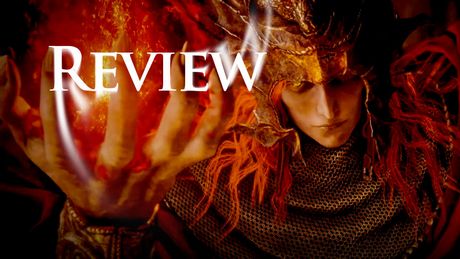
Elden Ring: Shadow of the Erdtree Review - Gem Hidden Under the Veil
game review
The Shadow of the Erdtree expansion is an awesome complement to the Elden Ring. FromSoftware did it again and provided us with a DLC of the highest possible level.
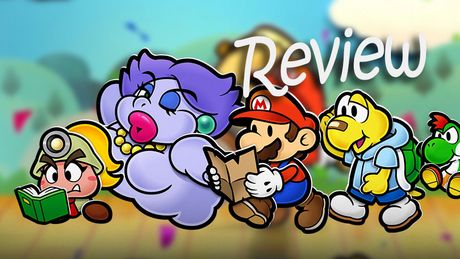
Paper Mario: The Thousand-Year Door Review: Unfolding a Classic
game review
20 years after its debut, one Paper Mario game still stands strong as the absolute best in the series. Can a Switch remake make it even better? See what we think in our review.

